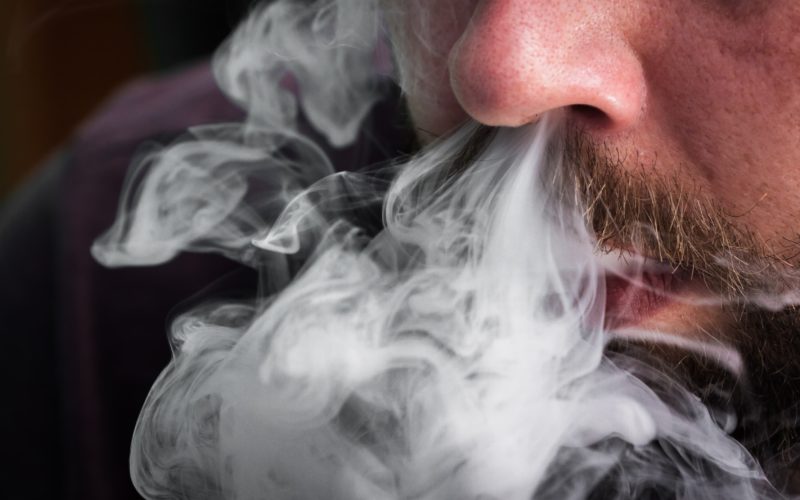Government
California Lawmakers Pass Bill Protecting Workers’ Off-Duty Cannabis Use

California lawmakers have approved a bill to protect the employment of workers who use cannabis.
California lawmakers on Tuesday gave final approval to a bill to protect employees who use marijuana off the job. If approved by the governor, the legislation would make California the seventh state in the nation to pass employment protections for workers’ off-duty cannabis use.
The measure, Assembly Bill 2188 (AB-2188), would “make it unlawful for an employer to discriminate against a person in hiring, termination, or any term or condition of employment, or otherwise penalize a person” solely because of marijuana use while off the job, according to an abstract of the legislation. But Assemblymember Bill Quirk, the sponsor of the legislation, noted that AB-2188 does not allow people to work while impaired by cannabis.
“Nothing in this bill would allow someone to come (to work) high,” said Quirk.
Under the legislation, employers would be prohibited from taking action against an employee for failing a urine or hair screening for cannabis metabolites. Tests that measure or detect the presence of cannabis metabolites only show that the person ingested cannabis at some point, potentially weeks before the sample is taken, and are not an indicator of present impairment.
The legislation is supported by cannabis advocates and labor groups including United Food and Commercial Workers (UFCW), Service Employees International Union (SEIU), California Nurses Association, CA Board of Registered Nursing, and UDW/AFSCME Local 3930. Supporters of the bill argue that employees should not be punished for using marijuana while off the clock.
“Using outdated cannabis tests only causes employees to feel unsafe and harassed at work, it does not increase workplace safety,” said Matt Bell, secretary-treasurer for the United Food and Commercial Workers Local 324.
The legislation includes several exceptions designed to protect employers. The bill does not apply to workers in the “building and construction trades” or to employees or applicants for positions that require a background check or security clearance under federal regulations. Additionally, the legislation does not preempt any federal or state statutes that require testing for controlled substances and would not apply to employment decisions based on “scientifically valid” pre-employment drug test methods “that do not screen for psychoactive cannabis metabolites.”
California Pioneered Cannabis Legalization
California was the first state to legalize the medicinal use of cannabis in 1996, and 20 years later voters legalized the recreational use of marijuana by adults. The National Organization for the Reform of Marijuana Laws (NORML) notes that six states (Nevada, New York, New Jersey, Connecticut, Montana and Rhode Island) have enacted laws to protect workers’ use of recreational cannabis off the job and 21 states offer worker protections for medical marijuana patients.
“Cannabis is legal in California, and workers have a right to engage in legal activity while away from the job. Yet countless workers and job applicants are losing job opportunities or being fired because they test positive for legal, off-the-job use of marijuana on account of indiscriminate urine and hair metabolite tests,” said Dale Gieringer, the director of NORML’s California chapter. “Scientific studies have failed to show that urine testing is effective at preventing workplace accidents. Numerous studies have found that workers who test positive for metabolites have no higher risk of workplace accidents.”
The California Chamber of Commerce is opposed to the legislation because it would “create a protected status for marijuana use” in state law that bans discrimination in the workplace.
“Put simply: marijuana use is not the same as protecting workers against discrimination based on race or national origin,” the business association wrote in a letter to state lawmakers.
AB-2188 was first passed by the California State Assembly in May, followed by the approval with amendments by the state Senate on Monday. On Tuesday, the Assembly approved the Senate version of the measure. The bill now heads to the desk of Democratic Governor Gavin Newsom, who has until the end of September to decide its fate. If Newsom signs the bill into law, it will go into effect on January 1, 2024.
Source: https://hightimes.com/news/california-lawmakers-pass-bill-protecting-workers-off-duty-cannabis-use/
Business
New Mexico cannabis operator fined, loses license for alleged BioTrack fraud

New Mexico regulators fined a cannabis operator nearly $300,000 and revoked its license after the company allegedly created fake reports in the state’s traceability software.
The New Mexico Cannabis Control Division (CCD) accused marijuana manufacturer and retailer Golden Roots of 11 violations, according to Albuquerque Business First.
Golden Roots operates the The Cannabis Revolution Dispensary.
The majority of the violations are related to the Albuquerque company’s improper use of BioTrack, which has been New Mexico’s track-and-trace vendor since 2015.
The CCD alleges Golden Roots reported marijuana production only two months after it had received its vertically integrated license, according to Albuquerque Business First.
Because cannabis takes longer than two months to be cultivated, the CCD was suspicious of the report.
After inspecting the company’s premises, the CCD alleged Golden Roots reported cultivation, transportation and sales in BioTrack but wasn’t able to provide officers who inspected the site evidence that the operator was cultivating cannabis.
In April, the CCD revoked Golden Roots’ license and issued a $10,000 fine, according to the news outlet.
The company requested a hearing, which the regulator scheduled for Sept. 1.
At the hearing, the CCD testified that the company’s dried-cannabis weights in BioTrack were suspicious because they didn’t seem to accurately reflect how much weight marijuana loses as it dries.
Company employees also poorly accounted for why they were making adjustments in the system of up to 24 pounds of cannabis, making comments such as “bad” or “mistake” in the software, Albuquerque Business First reported.
Golden Roots was fined $298,972.05 – the amount regulators allege the company made selling products that weren’t properly accounted for in BioTrack.
The CCD has been cracking down on cannabis operators accused of selling products procured from out-of-state or not grown legally:
- Regulators alleged in August that Albuquerque dispensary Sawmill Sweet Leaf sold out-of-state products and didn’t have a license for extraction.
- Paradise Exotics Distro lost its license in July after regulators alleged the company sold products made in California.
Golden Roots was the first alleged rulebreaker in New Mexico to be asked to pay a large fine.
Source: https://mjbizdaily.com/new-mexico-cannabis-operator-fined-loses-license-for-alleged-biotrack-fraud/
Business
Marijuana companies suing US attorney general in federal prohibition challenge

Four marijuana companies, including a multistate operator, have filed a lawsuit against U.S. Attorney General Merrick Garland in which they allege the federal MJ prohibition under the Controlled Substances Act is no longer constitutional.
According to the complaint, filed Thursday in U.S. District Court in Massachusetts, retailer Canna Provisions, Treevit delivery service CEO Gyasi Sellers, cultivator Wiseacre Farm and MSO Verano Holdings Corp. are all harmed by “the federal government’s unconstitutional ban on cultivating, manufacturing, distributing, or possessing intrastate marijuana.”
Verano is headquartered in Chicago but has operations in Massachusetts; the other three operators are based in Massachusetts.
The lawsuit seeks a ruling that the “Controlled Substances Act is unconstitutional as applied to the intrastate cultivation, manufacture, possession, and distribution of marijuana pursuant to state law.”
The companies want the case to go before the U.S. Supreme Court.
They hired prominent law firm Boies Schiller Flexner to represent them.
The New York-based firm’s principal is David Boies, whose former clients include Microsoft, former presidential candidate Al Gore and Elizabeth Holmes’ disgraced startup Theranos.
Similar challenges to the federal Controlled Substances Act (CSA) have failed.
One such challenge led to a landmark Supreme Court decision in 2005.
In Gonzalez vs. Raich, the highest court in the United States ruled in a 6-3 decision that the commerce clause of the U.S. Constitution gave Congress the power to outlaw marijuana federally, even though state laws allow the cultivation and sale of cannabis.
In the 18 years since that ruling, 23 states and the District of Columbia have legalized adult-use marijuana and the federal government has allowed a multibillion-dollar cannabis industry to thrive.
Since both Congress and the U.S. Department of Justice, currently headed by Garland, have declined to intervene in state-licensed marijuana markets, the key facts that led to the Supreme Court’s 2005 ruling “no longer apply,” Boies said in a statement Thursday.
“The Supreme Court has since made clear that the federal government lacks the authority to regulate purely intrastate commerce,” Boies said.
“Moreover, the facts on which those precedents are based are no longer true.”
Verano President Darren Weiss said in a statement the company is “prepared to bring this case all the way to the Supreme Court in order to align federal law with how Congress has acted for years.”
While the Biden administration’s push to reschedule marijuana would help solve marijuana operators’ federal tax woes, neither rescheduling nor modest Congressional reforms such as the SAFER Banking Act “solve the fundamental issue,” Weiss added.
“The application of the CSA to lawful state-run cannabis business is an unconstitutional overreach on state sovereignty that has led to decades of harm, failed businesses, lost jobs, and unsafe working conditions.”
Business
Alabama to make another attempt Dec. 1 to award medical cannabis licenses

Alabama regulators are targeting Dec. 1 to award the first batch of medical cannabis business licenses after the agency’s first two attempts were scrapped because of scoring errors and litigation.
The first licenses will be awarded to individual cultivators, delivery providers, processors, dispensaries and state testing labs, according to the Alabama Medical Cannabis Commission (AMCC).
Then, on Dec. 12, the AMCC will award licenses for vertically integrated operations, a designation set primarily for multistate operators.
Licenses are expected to be handed out 28 days after they have been awarded, so MMJ production could begin in early January, according to the Alabama Daily News.
That means MMJ products could be available for patients around early March, an AMCC spokesperson told the media outlet.
Regulators initially awarded 21 business licenses in June, only to void them after applicants alleged inconsistencies with how the applications were scored.
Then, in August, the state awarded 24 different licenses – 19 went to June recipients – only to reverse themselves again and scratch those licenses after spurned applicants filed lawsuits.
A state judge dismissed a lawsuit filed by Chicago-based MSO Verano Holdings Corp., but another lawsuit is pending.
Source: https://mjbizdaily.com/alabama-plans-to-award-medical-cannabis-licenses-dec-1/
-

 Business2 years ago
Business2 years agoPot Odor Does Not Justify Probable Cause for Vehicle Searches, Minnesota Court Affirms
-

 Business2 years ago
Business2 years agoNew Mexico cannabis operator fined, loses license for alleged BioTrack fraud
-

 Business2 years ago
Business2 years agoAlabama to make another attempt Dec. 1 to award medical cannabis licenses
-

 Business2 years ago
Business2 years agoWashington State Pays Out $9.4 Million in Refunds Relating to Drug Convictions
-

 Business2 years ago
Business2 years agoMarijuana companies suing US attorney general in federal prohibition challenge
-

 Business2 years ago
Business2 years agoLegal Marijuana Handed A Nothing Burger From NY State
-

 Business2 years ago
Business2 years agoCan Cannabis Help Seasonal Depression
-

 Blogs2 years ago
Blogs2 years agoCannabis Art Is Flourishing On Etsy













